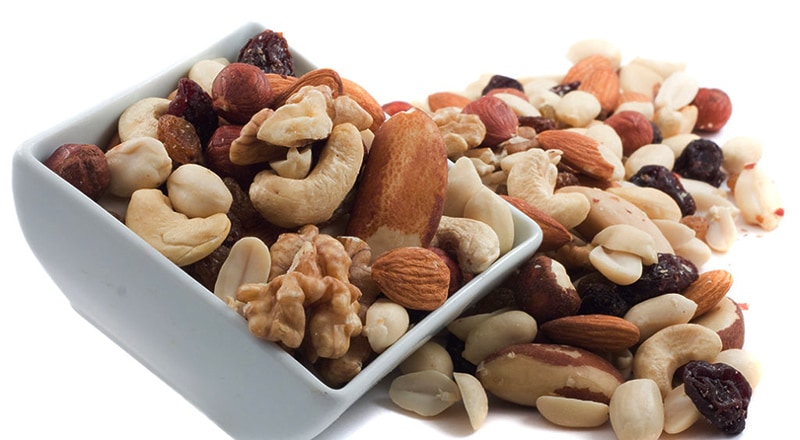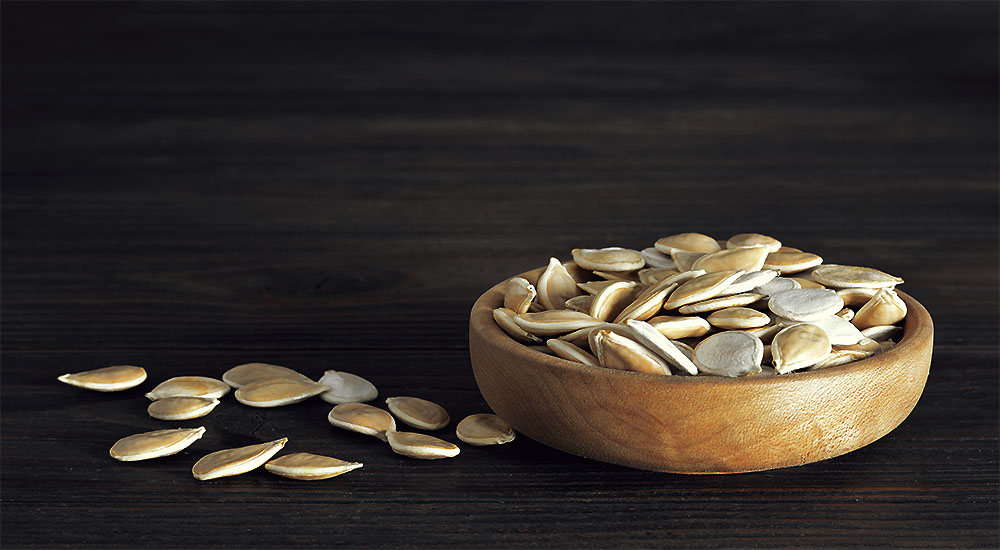Nuts, Fat and… Weight Loss?

Bottom Line: Do nuts make you fat?
Nuts are calorie-dense and high fat; how can they not cause weight gain? Too often we fall prey to the “everyone knows” data – data that in fact is completely false.
Here’s an example: Diet sweeteners cause weight loss. Of course, they’re zero calories, how could they do anything else? It would be like saying drinking water, also zero-calorie would cause you to somehow gain weight. Ridiculous, right?
In the case of water, yes, but diet sweeteners are proven to cause weight gain.
And, you probably know where I’m going with this…
Nuts DO NOT cause you to gain weight, and their health benefits make them an important part of a meal plan designed to regain your health.
There have been dozens of studies done on nuts validating the lack of weight gain associated with eating them. Please note that food quality is everything and the nuts you consume should be raw and organic – not roasted, salted, honeyed, or sugared varieties.
Extra handfuls of nuts every day and no weight gain
- There were studies where two handfuls of nuts were added to the diet every day for six months. Calorically speaking, participants should have gained more than 15 lb, but instead, the men gained less than a pound and the women gained about one-quarter of a pound. It was such a small weight change over the course of 6 months that is wasn’t considered to be statistically significant.
- Many studies showed no weight gain at all, even after having participants add two handfuls of walnuts a day to their diet.
- An aggressive study that added three handfuls of pecans, every day for 8 weeks resulted in no weight gain.
Most studies tried to keep participant’s calories the same (the nut and no-nut groups) and just used the high-fat nut instead of other calories. Yet in some cases, participants lost weight on the nut calories even where they ended up consuming more calories than the non-nut eating group.
Decrease your belly fat with nuts
What about long term studies? Again, there is ample evidence to support that even in studies lasting up to 6 years, there was no weight gain. And the nut eaters enjoyed a lowered risk of developing belly fat as compared to the no-nut group.
If you substitute nut calories with candy, however, there is definitely a change. Just two weeks of candy consumption increases body weight, but the same calories in nuts yielded no weight gain.
When it came to waist measurement, those eating the most nuts and veggies enjoyed the slimmest waists, while those eating the most meat had the widest.
If nut intake is compared to weight, a cross-sectional study found the thinnest people to eat the most nuts and the chubbiest ate the least. Nut consumption, with all its beautiful fat, translated into a lower body mass index overall.
The studies go on and on.
Harvard study recommends nuts for weight loss
A Harvard study found weight gain to be associated with, not surprisingly, junk food like soda, fries, and chips… and meat. Weight loss is associated with veggies, nuts, fruits, and whole grains.
Their conclusion: “minimally process foods such as nuts, fruits, vegetables and whole grains should be increased.”
Nuts keep your heart healthy
A 2012 study concluded that nuts lower inflammation, improve cholesterol, and arterial function (heart-healthy), and they do it all without causing weight gain.
Literally every study in which nuts were added to the diet without trying to restrict calories failed to show the expected weight gain based on the number of extra calories consumed. Either the weight gain was minimal, there was no weight gain or participants lost weight.
Why don’t nuts cause weight gain?
Okay, now the 64 million dollar question – Why?
How do nuts refuse to cause weight gain despite their high fat calories? By what necromancy does this occur?
It turns out to be a combination of factors:
Pistachio principle? Poop theory?
The was a cute theory dubbed the “pistachio principle” where it was thought that in-shell pistachios slowed the rate of consumption because those pesky little shells took time to open. They postulated that the intervening time allowed your brain to figure out you’d eaten enough. Interesting, but not born out once you compared it to shell-free nuts, that also didn’t cause weight gain.
Nuts are hard and it takes some effort to chew them but again, this wasn’t born out as a viable reason for lack of weight gain because once nuts were put in smoothies and ground to butter they still didn’t cause weight gain. In fact when they compared half a cup of peanuts vs peanut butter, added on to someone’s regular dietary consumption, even after a month no substantial weight gain occurred. Therefore the “chewing” theory was unsubstantiated.
There’s a “poop excretion theory” that states that since the cell walls of almonds, as an example, remain intact in the digestive tract, we perhaps “lose” calories through our stool. This theory too was debunked with the peanut butter results since it was well ground and still, those participants didn’t gain the expected weight.
Nuts are filling so you eat less other food?
Are nuts so satisfying and filling that we unconsciously eat fewer calories of other foods when they’re included in our diet? Now we’re getting somewhere…
A fascinating study was done by adding walnuts to a fruit smoothie. They included strawberries, banana, other frozen berries, and pineapple juice, plus ground walnuts. The “other smoothie” contained everything the same including walnut flavoring, but no actual walnuts. Both smoothies contained she same calories and tasted identical – this was a double-blind study.
What do you think happened?
The consumers of the “no walnut” smoothie were less satisfied than those who had the nuts in their smoothie. The nuts were satisfying and filling and likely lead to eating less overall due to that fact.
Nuts are fat burners?
There’s also the fat burning theory – nuts actually boost our fat burning, so despite their hefty fat calories, your body compensates by burning more. Let’s see how this was borne out in the research.
The walnut study compared fat burning and discovered the placebo group (no walnuts) burned about 20 grams of fat while they slept, but the walnut group, who was consuming the SAME number of calories, burned about 31 grams of fat each day. Their bodies burned more fat to compensate for the healthy nut consumption.
Summary
Here’s the upshot of what a lot of different researchers found:
1. Nuts suppress your appetite
2. Nuts cause you to lose fat in your stool
3. Nuts boost your fat metabolism
Each of the points above seems to contribute equally to addressing why the calories associated with nut consumption do not result in weight gain. Mystery solved!
Why eat nuts?
They’re loaded with fiber which keeps your digestive tract and microbiome happy.
They contain healthy fat and are heart-protecting in a big way. Nuts are estimated to cut your risk of dying from heart disease in half.
Do you need help with your health?
We have the diagnostic and testing tools, the clinical experience, and a different medical approach to discovering the root cause of why you have the symptoms that are bothering you. As long as you are ready to make some dietary and lifestyle changes, we can help you. We will "hold your hand" through the changes, step by step, to make each step an easy one. We are located in Clearwater, FL, at 1000 S Ft Harrison, at the corner of Ft. Harrison Ave. and Magnolia St. There is plenty of parking space directly accessible from Ft Harrison. If it is not convenient for you to come to Root Cause Medical Clinic, we offer telehealth/telemedicine consultations to residents of certain states. Call us for details.
Contact us for a Consultation – Call 727-335-0400

Dr. Vikki Petersen DC. CCN
Founder of Root Cause Medical Clinic
Certified Functional Medicine Practitioner
Dr Vikki Petersen is a public speaker, author of two books, several eBooks and creates cutting edge content for her YouTube community. Dr Vikki is committed to bringing Root Cause Medicine and its unique approach to restoring health naturally to the world.
Ask a Doctor
Have a health concern you'd like to speak with a doctor about? Or just want clarity on a subject? Ask Us!
Featured Articles
Popular Stories
Dozens of studies have been reviewed, and thanks to the amazing legwork of Dr. Greger’s team at nutritionfacts.org, many are cited below.
References:
• Natoli S, McCoy P. A review of the evidence: nuts and body weight. Asia Pac J Clin Nutr. 2007;16(4):588-97.
• Martínez-González MA, Bes-Rastrollo M. Nut consumption, weight gain and obesity: Epidemiological evidence. Nutr Metab Cardiovasc Dis. 2011 Jun;21 Suppl 1:S40-5.
• Alper CM, Mattes RD. Effects of chronic peanut consumption on energy balance and hedonics. Int J Obes Relat Metab Disord. 2002 Aug;26(8):1129-37.
• Sabaté J, Cordero-Macintyre Z, Siapco G, Torabian S, Haddad E. Does regular walnut consumption lead to weight gain? Br J Nutr. 2005 Nov;94(5):859-64.
• Fraser GE, Bennett HW, Jaceldo KB, Sabaté J. Effect on body weight of a free 76 Kilojoule (320 calories) daily supplement of almonds for six months. J Am Coll Nutr. 2002 Jun;21(3):275-83.
• Claesson AL, Holm G, Ernersson A, Lindström T, Nystrom FH. Two weeks of overfeeding with candy, but not peanuts, increases insulin levels and body weight. Scand J Clin Lab Invest. 2009;69(5):598-605.
• Foster GD, Shantz KL, Vander Veur SS, Oliver TL, Lent MR, Virus A, Szapary PO, Rader DJ, Zemel BS, Gilden-Tsai A. A randomized trial of the effects of an almond-enriched, hypocaloric diet in the treatment of obesity. Am J Clin Nutr. 2012 Aug;96(2):249-54.
• Casas-Agustench P, Bulló M, Ros E, Basora J, Salas-Salvadó J; Nureta-PREDIMED investigators. Cross-sectional association of nut intake with adiposity in a Mediterranean population. Nutr Metab Cardiovasc Dis. 2011 Jul;21(7):518-25.
• Li Z, Song R, Nguyen C, Zerlin A, Karp H, Naowamondhol K, Thames G, Gao K, Li L, Tseng CH, Henning SM, Heber D. Pistachio nuts reduce triglycerides and body weight by comparison to refined carbohydrate snack in obese subjects on a 12-week weight loss program. J Am Coll Nutr. 2010 Jun;29(3):198-203.
• Vinson JA, Cai Y. Nuts, especially walnuts, have both antioxidant quantity and efficacy and exhibit significant potential health benefits. Food Funct. 2012 Feb;3(2):134-40.
• Wang X, Li Z, Liu Y, Lv X, Yang W. Effects of pistachios on body weight in Chinese subjects with metabolic syndrome. Nutr J. 2012 Apr 3;11(1):20.
• Fogelholm M, Anderssen S, Gunnarsdottir I, Lahti-Koski M. Dietary macronutrients and food consumption as determinants of long-term weight change in adult populations: a systematic literature review. Food Nutr Res. 2012;56.
• Mozaffarian D, Hao T, Rimm EB, Willett WC, Hu FB. Changes in diet and lifestyle and long-term weight gain in women and men. N Engl J Med. 2011 Jun 23;364(25):2392-404.
• Martínez-González MA, García-Arellano A, Toledo E, Salas-Salvadó J, Buil-Cosiales P, Corella D, Covas MI, Schröder H, Arós F, Gómez-Gracia E, Fiol M, Ruiz-Gutiérrez V, Lapetra J, Lamuela-Raventos RM, Serra-Majem L, Pintó X, Muñoz MA, Wärnberg J, Ros E, Estruch R; for the PREDIMED Study Investigators. A 14-Item Mediterranean Diet Assessment Tool and Obesity Indexes among High-Risk Subjects: The PREDIMED Trial. PLoS One. 2012;7(8):e43134.
• O’Neil CE, Keast DR, Nicklas TA, Fulgoni VL 3rd. Out-of-hand nut consumption is associated with improved nutrient intake and health risk markers in US children and adults: National Health and Nutrition Examination Survey 1999-2004. Nutr Res. 2012 Mar;32(3):185-94.
• O’Neil CE, Keast DR, Nicklas TA, Fulgoni VL 3rd. Nut consumption is associated with decreased health risk factors for cardiovascular disease and metabolic syndrome in U.S. adults: NHANES 1999-2004. J Am Coll Nutr. 2011 Dec;30(6):502-10.
• Jornayvaz FR. Diet, lifestyle, and long-term weight gain. N Engl J Med. 2011 Sep 15;365(11):1058-9; author reply 1059.
• Natoli S, McCoy P. A review of the evidence: nuts and body weight. Asia Pac J Clin Nutr. 2007;16(4):588-97.
• Mattes RD, Dreher ML. Nuts and healthy body weight maintenance mechanisms. Asia Pac J Clin Nutr. 2010;19(1):137-41.
• Painter, J. The pistachio principle: calorie reduction without calorie restriction. Weight Management Matters. 2008;6:8.
• Berry SE, Tydeman EA, Lewis HB, Phalora R, Rosborough J, Picout DR, Ellis PR. Manipulation of lipid bioaccessibility of almond seeds influences postprandial lipemia in healthy human subjects. Am J Clin Nutr. 2008 Oct;88(4):922-9.
• Murakami K, Sasaki S, Takahashi Y, Uenishi K, Yamasaki M, Hayabuchi H, Goda T, Oka J, Baba K, Ohki K, Kohri T, Muramatsu K, Furuki M. Hardness (difficulty of chewing) of the habitual diet in relation to body mass index and waist circumference in free-living Japanese women aged 18-22 y. Am J Clin Nutr. 2007 Jul;86(1):206-13.


